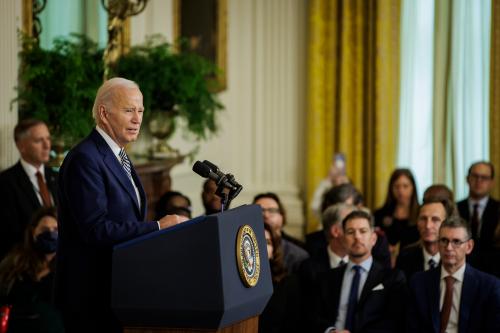Extreme poverty around the world has decreased from around 2 billion people in 1990 living under $2 per day to 700 million today. Further, nine out of 10 children are now enrolled in primary schools, an increase over the last 15 years. Progress in both areas since 2000 has been part of the United Nations Millennium Development Goals, which set targets for reducing extreme poverty in eight areas, and which were the guiding principles for global development from 2000 to 2015. Today, the global community, through the UN, has adopted 17 Sustainable Development Goals to continue these poverty reduction efforts.
In this new episode of Intersections podcast, host Adrianna Pita engages Brookings scholars Laurence Chandy and Rebecca Winthrop in a discussion of how digital technologies can be harnessed to bring poverty reduction and education to the most marginalized populations.
Listen:
Chandy, a fellow in the Global Economy and Development program at Brookings, says that the trends in getting people digitally connected “are progressing at such speed that they’re starting to reach some of the poorest people in the world. Digital technology is changing what it means to be poor because it’s bringing poor people out of the margins.”
Winthrop, a senior fellow and director of the Center for Universal Education at Brookings, says that “I think [education] access is crucial. And I do think that’s almost the first wave because without it we could work on all the ed tech—fabulous apps, great language translated content—but if you do not have the access it’s not going to reach the most marginalized.”
Listen to this episode above; subscribe on iTunes; and find more episodes on our website.
Chandy was a guest on the Brookings Cafeteria Podcast in 2013; Winthrop has been a guest on the Cafeteria a few times to discuss global education topics, including: access plus education; investing in girls’ education; and getting millions learning in the developing world.


Commentary
New episode of Intersections podcast explores technology’s role in ending global poverty and expanding education
May 27, 2016